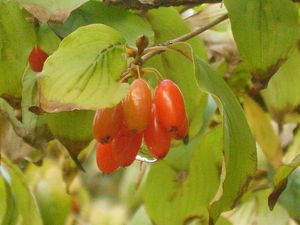
Pinyin: Shan Zhu Yu Latin: Cornus Fructus Officinalis
Physical Characteristics
Cornus Fructus Officinalis is a decidious Shrub growing to 10m by 10m hardy to zone 6 not frost tender in flower from February to March, and the seeds ripen in September. The Corni Officinalis flowers are hermaphrodite (have both male and female organs) and are pollinated by Insects. The plant prefers light (sandy), medium (loamy) and heavy (clay) soils and can grow in heavy clay soil. The plant prefers acid, neutral and basic (alkaline) soils, can grow in very alkaline soil, can grow in semi-shade (light woodland) or no shade and requires moist soil.
Family
Edible Uses*
Edible Parts: Fruit.*
Cornus Fructus Fruit is used raw or cooked[105, 177]. The fully ripe fruit is quite pleasant but slightly astringent[K]. They are about 1.5cm long[200]. The fruit contains about 8.6% sugars, 2.9% malic acid, 0.74% ash[179].*
Traditional Chinese Medicinal (TCM) Uses*
Shan Zhu Yu has been used for at least 2,000 years in Chinese herbal medicine. Cornus Fructus is a herb that "stabilizes and binds" and is used principally to reduce heavy menstrual bleeding and unusually active secretions including copious sweating, excessive urine, spermatorrhoea and premature ejaculation[147, 238, 254].*
Like all herbs that suppress bodily fluids (even excessive ones), Shan Zhu Yu will simply prolong or lead to a worsening of symptoms if it is used without tonic or detoxifying herbs[254]. It is, therefore, normally used in combination with herbs such as Rehmannia glutinosa and is an ingredient of the "Pill of eight ingredients" which is used in China to "warm up and invigorate the yang of the loins"[254].*
The Cornus Officinalis fruit is antibacterial, antifungal, hypotensive, antitumor, astringent, diuretic, hepatic and tonic[116, 147, 176, 178, 238]. The fruit, without the seed, is decocted for the treatment of arthritis, fever and a wide range of other ailments[218, 279]. Cornus Officinalis used in the treatment of senile lumbago, diabetes, cystitis, tinnitus etc[174, 254, 279].*
The Corni Officinalis fruit has an antibacterial action, inhibiting the growth of Bacillus dysenteriae and Staphylococcus[176]. The fruit is harvested when fully ripe and is dried for later use[238]. The stem bark is astringent, antimalarial and tonic[218]. The plant is antibacterial, diuretic, hypotensive and a urinary antiseptic[218].*
References
- [K] Ken Fern - Notes from observations, tasting etc at Plants For A Future and on field trips.
- [78] Sheat. W. G.Propagation of Trees, Shrubs and Conifers. MacMillan and Co 1948
- [80] McMillan-Browse. P.Hardy Woody Plants from Seed. Grower Books 1985 ISBN 0-901361-21-6
- [105] Tanaka. T.Tanaka's Cyclopaedia of Edible Plants of the World. Keigaku Publishing 1976
- [109] Wilson. E. H.Plantae Wilsonae. 0
- [113] Dirr. M. A. and Heuser. M. W.The Reference Manual of Woody Plant Propagation. Athens Ga. Varsity Press 1987 ISBN 0942375009
- [116] Brooklyn Botanic GardenOriental Herbs and Vegetables, Vol 39 No. 2. Brooklyn Botanic Garden 1986
- [147] ?A Barefoot Doctors Manual. Running Press 0 ISBN 0-914294-92-X
- [164] Bird. R. (Editor)Growing from Seed. Volume 4. Thompson and Morgan. 1990
- [174] Kariyone. T.Atlas of Medicinal Plants. 0
- [176] Yeung. Him-Che.Handbook of Chinese Herbs and Formulas. Institute of Chinese Medicine, Los Angeles 1985
- [177] Kunkel. G.Plants for Human Consumption. Koeltz Scientific Books 1984 ISBN 3874292169
- [178] Stuart. Rev. G. A.Chinese Materia Medica. Taipei. Southern Materials Centre 0
- [179] Reid. B. E.Famine Foods of the Chiu-Huang Pen-ts'ao. Taipei. Southern Materials Centre 1977
- [200] Huxley. A.The New RHS Dictionary of Gardening. 1992. MacMillan Press 1992 ISBN 0-333-47494-5
- [218] Duke. J. A. and Ayensu. E. S.Medicinal Plants of China Reference Publications, Inc. 1985 ISBN 0-917256-20-4
- [238] Bown. D.Encyclopaedia of Herbs and their Uses. Dorling Kindersley, London. 1995 ISBN 0-7513-020-31
- [254] Chevallier. A.The Encyclopedia of Medicinal Plants Dorling Kindersley. London 1996 ISBN 9-780751-303148
- [279] Medicinal Plants in the Republic of Korea World Health Organisation, Manila 1998 ISBN 92 9061 120 0
Source: Cornus Fructus Officinalis Shan Zhu Yu Plants For A Future, England 1996-2008.
This work is licensed under a Creative Commons License.

 Get Well Natural, LLC
Get Well Natural, LLC  Kidney Function & Regeneration Health
Kidney Function & Regeneration Health  Platelet & Blood Cell Health
Platelet & Blood Cell Health  Prostate, Flow & Function Health
Prostate, Flow & Function Health  General Mind & Body Health
General Mind & Body Health  Heart, Cholesterol & Cardio Health
Heart, Cholesterol & Cardio Health  Allergy-Free Body
Allergy-Free Body  Anxiety & Stress
Anxiety & Stress  Blood Platelet Counts & Function
Blood Platelet Counts & Function  Blood Pressure Health
Blood Pressure Health  Kidney Function Health
Kidney Function Health  Immune System Health & Balance
Immune System Health & Balance  Prostate & Urinary Health Function
Prostate & Urinary Health Function  Blood Sugar Balance
Blood Sugar Balance  Cardiovascular Heart Health
Cardiovascular Heart Health  Detoxification & Healthy Cells
Detoxification & Healthy Cells  Women's Health
Women's Health  Liver Regeneration
Liver Regeneration  Pain-Free Body
Pain-Free Body  Water & Air Filtration
Water & Air Filtration 


